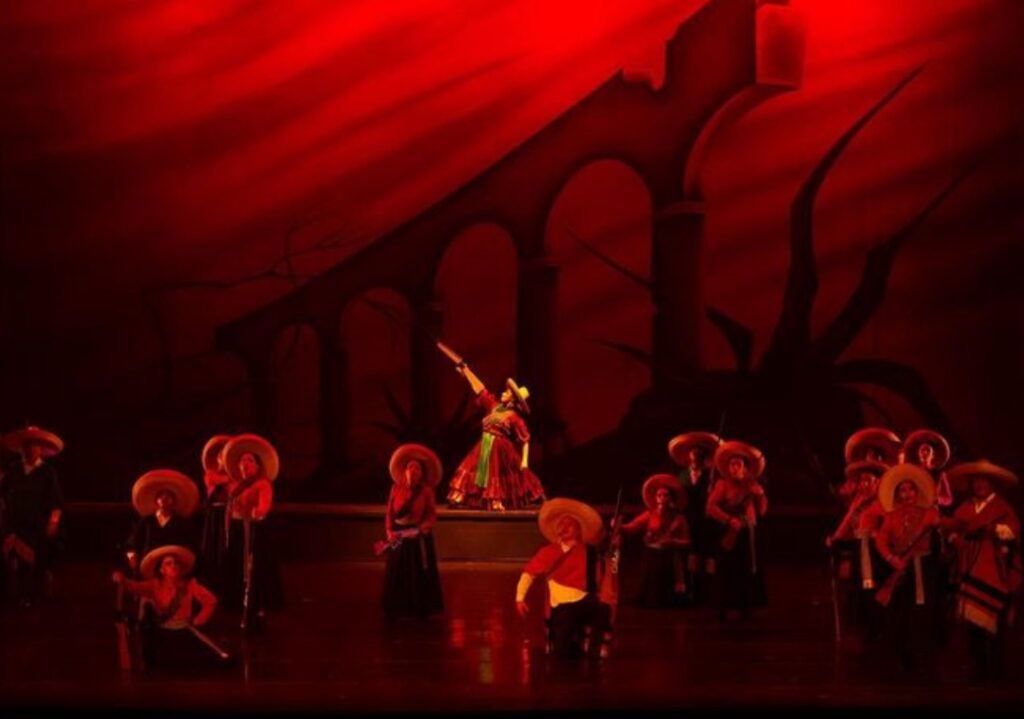
This past week, a group from the Mile Hi Veterans organization is visiting some of Mexico’s most important cultural sites. Among the activities was attending the performance of the world famous Ballet Folklorico de Mexico de Amalia Hernandez at the beautiful Bellas Artes building.
Over the years, having the opportunity to attend one of their performances is a treat that lasts a lifetime in the sensibilities of those present. This performance was no different as the talent displayed in the dance presentations is second to none.
Featured on stage were the pre-Colombian sounds, the Northern Mexican music, the Bajio region centered in Jalisco style and the Jarocho art of Veracruz. As different as the music and dance concepts were, they centered on one theme: patriotism.
The projection of the patriotic theme in the performance is exemplified in the songs of the Mexican Revolution. It is as though there is a “pull” toward the standards and values created by the great event.
Mexico seems to want to come back to the road it gradually deviated from over the years. This appears to be why the Mexican Revolution looms large in the music and dance presentations of the Ballet.
That is in line with the ongoing political aspirations of the country as expressed by the national vote in the beginning of the month. It is also in line with what the Mexican political leadership calls the Fourth Transformation.
The term comes from the notion of identifying key moments that radically changed the history of the country. The First Transformation is represented by the Mexican movement to independence in 1821.
The Second Transformation comes the Liberal Reforms led in part by the great Benito Juarez between 1858 and 1861. The Third Transformation is the Mexican Revolution fought between 1910 and 1917.

The Fourth Transformation also appears to be based on the Mexican Revolution and the ideals brought forth as a result of the bloody affair. The notion of improving the lives of the masses is basic to both.
There was a scene in the Ballet Folklorico performance that brought out the “Adelitas,” the women that fought along side of the men in the Revolution. Dressed in black and red, these armed women remind me very much of of the “Adelitas” in the Ballet Folklorico de Aztlan, a ballet that was part of the Crusade for Justice organization in Denver.
The “Adelita” segment of the Mexican Ballet presentation stimulated a series of mixed emotions around the reality of war. First there is the aggressive threat with challenging violence. Then there is the feeling associated with the chaos of war and an almost carnival atmosphere of death and destruction. In the third, a deep emotion is created by the slowing of the song and its dance depicting the sadness of departure and the human need to be remembered.
The Ballet performance begins with the evocation of pre-Colombian Mesoamerican rituals that provide the foundation of Mexican identity. Then, throughout the performance there is a tendency to return to that concept as a counterpoint to a new beginning depicted by the Mexican Revolution and the commitment it portrays in a dramatic fashion.
The Ballet Folklorico on this occasion reflects contemporary developments in Mexico’s social and political way of life. Much of the climate in this regard suggests a radically different direction for the country.
There is an edge to the Ballet Folklorico de Mexico de Amalia Hernandez. It is so because it is a call to patriotism and another beginning.
The views expressed by David Conde are not necessarily the views of laVozColorado. Comments and responses may be directed to news@lavozcolorado.com.




